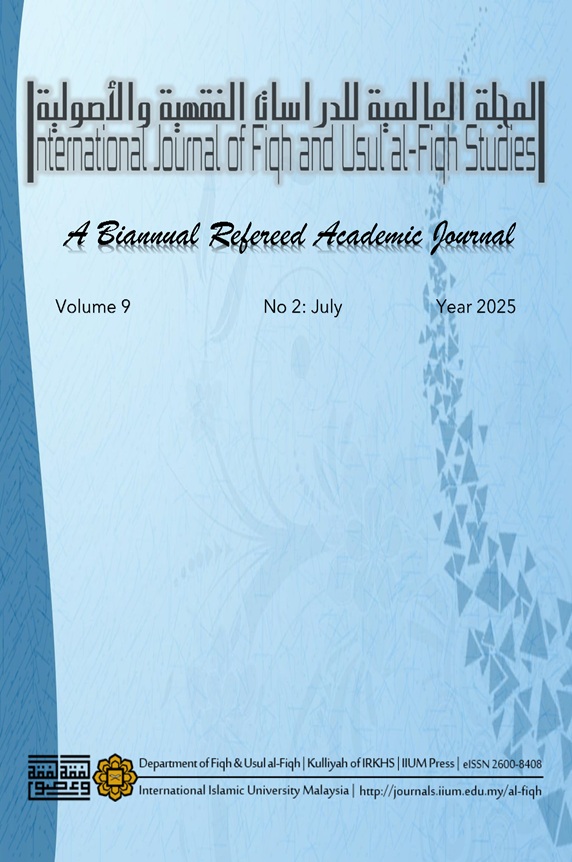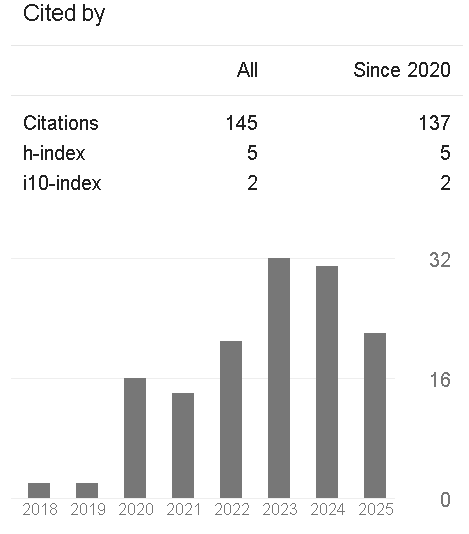The Strategic Role of the Islamic Gold Dinar in Countering the Dominance of the US Dollar: Challenges and Practices
DOI:
https://doi.org/10.31436/ijfus.v9i2.374Keywords:
Gold Dinar, Strategic, Confrontation, Dominance, US Dollar, Challenges and PracticesAbstract
People are fed up with the continued dominance of the US Dollar and its control over local currencies in Islamic countries and other countries aspiring to independence from Western dependence. Muslims are looking forward to monetary independence that prevents usury and ensures fair development, by returning to the currencies that Muslims used to achieve their ancient renaissance, in accordance with the guidance of the Prophet: "You are more knowledgeable about your worldly affairs" (Muslim). The research aims to explore the strategy of the Islamic Gold Dinar as a mechanism to enhance financial independence, confront the US Dollar, and develop the Islamic economy, by influencing the value of the US Dollar and breaking its global dominance over vulnerable peoples, and then stabilizing the value of Islamic money in the event that the Gold Dinar and the Silver Dirham are used, which will be a global currency if all Islamic countries adopt it and agree to use it as an alternative currency to the European Euro and the US Dollar. The problem of the study revolves around the dominance of the US Dollar and its high exchange rate versus the floating and depreciation of the currencies of Islamic countries that aspire to issue an Islamic currency as an alternative if they overcome the challenges and find understanding among themselves. The idea of the research will be implemented through the descriptive analytical approach, and the researcher does not dispense with the inductive approach in order to reach the desired results. Among the most important expected conclusions is discussing the challenges that may face this strategy, in addition to effective practices and their application on the ground that can be adopted to achieve the goals of controlling and overcoming the high Dollar exchange rate and stabilizing the low value of the currencies of Islamic countries, which would enhance development and improve the economic rate of Islamic countries.
Downloads
Metrics
References
Al-Ālūsī, S. al-D. M. ibn ʿA. (n.d.). Rūḥ al-Maʿānī fī Tafsīr al-Qurʾān al-Karīm wa al-Sabʿ al-Mathānī. Dār al-Kutub al-ʿIlmiyyah.
Al-Bayhaqi, A. B. A. ibn al-Ḥ. (2011). Al-Sunan al-Kubrā. Ḥijr Center for Research for Arabic and Islamic Studies.
Al-Dīnūrī, A. ibn D. (1960). Al-Akhbār al-Ṭiwāl. Dār Iḥyāʾ al-Kutub al-ʿArabiyyah.
Al-Muhallab, A. ibn ʿA. Ṣ. A. (2009). Al-Mukhtaṣar al-Naṣīḥ fī Tahdhīb al-Kitāb al-Jāmiʿ al-Ṣaḥīḥ. Dār al-Tawḥīd.
Al-Qaradāghī, M. al-D. (n.d.). The effect of inflation and recession. Journal of the Islamic Fiqh Academy, 1, 1019-1020.
Al-Rāzī, M. ibn ʿU. ibn al-Ḥ. (n.d.). Mafātīḥ al-Ghayb - al-Tafsīr al-Kabīr. Dār Iḥyāʾ al-Turāth al-Islāmī.
Al-Ṣābūnī, M. ʿA. (1981). Mukhtaṣar Tafsīr Ibn Kathīr. Dār al-Qurʾān al-Karīm.
Al-Ṣalūs, ʿA. A. (n.d.). Rulings on money and currency exchange in Islamic jurisprudence. Journal of the Islamic Fiqh, 1, 933-934.
Al-Saqqāf, ʿA. ibn ʿA. al-Q. (n.d.). Zakāt on the two currencies. The Encyclopedia of Fiqh, 3, 237-238.
Al-Shāshī, A. ibn M. ibn I. (1982). Uṣūl al-Shāshī. Dār al-Kitāb al-ʿArabī.
Al-Tirmidhī, M. ibn ʿĪ. (1996). Al-Jāmiʿ al-Kabīr - Sunan al-Tirmidhī. Dār al-Gharb al-Islāmī.
Al-ʿUthaymīn, M. ibn Ṣ. (2000). Majmūʿ Fatāwā wa Rasāʾil al-ʿUthaymīn. Dār al-Waṭan.
Bin Bayyah, ʿA. (n.d.). Rulings on paper money and the change in the value of currency. Journal of the Islamic Fiqh Academy, 4, 907-908.
Bin Salām, ʿA. (n.d.). Kitāb al-Amwāl. Dār al-Fikr.
Edrīs, M., et al. (2024). Profiting through traditional gold mining in Sudan as an investment mechanism: Risks and challenges. Al-Qanāṭir: International Journal of Islamic Studies, 33(6), 384-401.
Faḍīlo, ʿU. I. (2003). The Islamic golden dinar. Al Jazeera. Retrieved 2024, from https://www.aljazeera.net
Ḥammūd, S. Ḥ. A. (1982). Taṭwīr al-Aʿmāl al-Maṣrafiyyah bi mā yattafiq wa al-Sharīʿah al-Islāmiyyah [Doctoral dissertation] (2nd ed.). Maṭbaʿat al-Sharq wa Maktabatuhā.
Hishamuddin, M. K. (2024). Revisiting the gold and silver nisab for zakat: A numismatic study of prophetic era dinar and dirham weights and measures. Malaysian Journal of Syariah and Law, 12(1), 245-266. https://doi.org/10.33102/mjsl.vol12no1.569
Ḥussayn, I. (2007). The gold dinar and the silver dirham: Islam and the future of money. Mosque of the Imams.
Ibn Ḥanbal, A. (2001). Musnad al-Imām Aḥmad ibn Ḥanbal. Al-Risālah Foundation.
Ibn Kathīr, I. ibn ʿU. (1999). Tafsīr al-Qurʾān al-ʿAẓīm. Dār Ṭaybah for Publishing and Distribution.
Ibn Khaldūn, ʿA. al-R. (1981). Tārīkh Ibn Khaldūn. Dār al-Fikr.
Ibn Mājah, M. ibn Y. (2009). Sunan Ibn Mājah (Al-Arnaʾūṭ, Ed.). Dār al-Risālah al-ʿĀlamiyyah.
Ibn Mājah, M. ibn Y. (2017). Sunan Ibn Mājah. Maktabat al-Maʿārif.
Ibn Taymiyyah, A. (2004). Majmūʿ al-Fatāwā. King Fahd Complex.
Kamāl, ʿA. al-S. (2017). Islamic civilization: Culture, art, and urbanism. Borouge Company.
Mālik ibn A. (1991). Muwaṭṭaʾ al-Imām Mālik. Al-Risālah Foundation.
Mansour, A. (2020). Can the golden dinar end the dollar's global dominance? A scientific interview with Dr. Mahathir Mohamad. Al Jazeera News Channel.
Muslim ibn al-Ḥ. (1955). Ṣaḥīḥ Muslim. Dār Iḥyāʾ al-Turāth al-ʿArabī.
Naglāʾ, ʿA. al-M. (2021). Money in Islam. GIEM, 104, 41-146. https://kantakji.com
Owolabi Yusuf, M.-B., et al. (2015). Acceptance of gold as an alternative currency: An empirical validation of adoption of innovation theory. Asian Journal of Business and Accounting, 8(2), 123-153.
Peredaryenko, M. (2019). Gold dinar as a consumer product: A modified version of the theory of planned behavior. International Journal of Economics, Management and Accounting, 27(2), 353-372. https://doi.org/10.31436/ijema.v27i2.747
Sadegh, M. al-S. (2023, March 12). The dream of the Islamic golden dinar: A vision for a bright economic future that restores the glories of the nation. The Union of the Muslim World. https://www.unitedmuslimworld.com
Shaher, A. A. (2003, December 2). The Islamic golden dinar. Al Jazeera. https://www.aljazeera.net/ebusiness
The Kuwaiti encyclopedia of jurisprudence. (n.d.). The legal dinar (Vol. 45, pp. 21-28). Ministry of Awqāf and Islamic Affairs, Dār al-Salāsil.
Downloads
Published
How to Cite
Issue
Section
License
Copyright (c) 2025 International Journal of Fiqh and Usul al-Fiqh Studies

This work is licensed under a Creative Commons Attribution-NonCommercial 4.0 International License.
The IIUM journal follows the open access policy.
Consent to publish: The Author(s) agree to publish their articles with IIUM Press.
Declaration: The Author(s) declare that the article has not been published before in any form and that it is not concurrently submitted to another publication, and also that it does not infringe on anyone’s copyright. The Author(s) holds the IIUM Press and Editors of the journal harmless against all copyright claims.
Transfer of copyright: The Author(s) hereby agree to transfer the copyright of the article to IIUM Press, which shall have the exclusive and unlimited right to publish the article in any form, including in electronic media. However, the Author(s) will reserve the right to reproduce the article for educational and scientific purposes provided that the written consent of the Publisher is obtained. For the article with more than one author, the corresponding author confirms that he/she is authorized by his/her co-author(s) to grant this transfer of copyright.





















